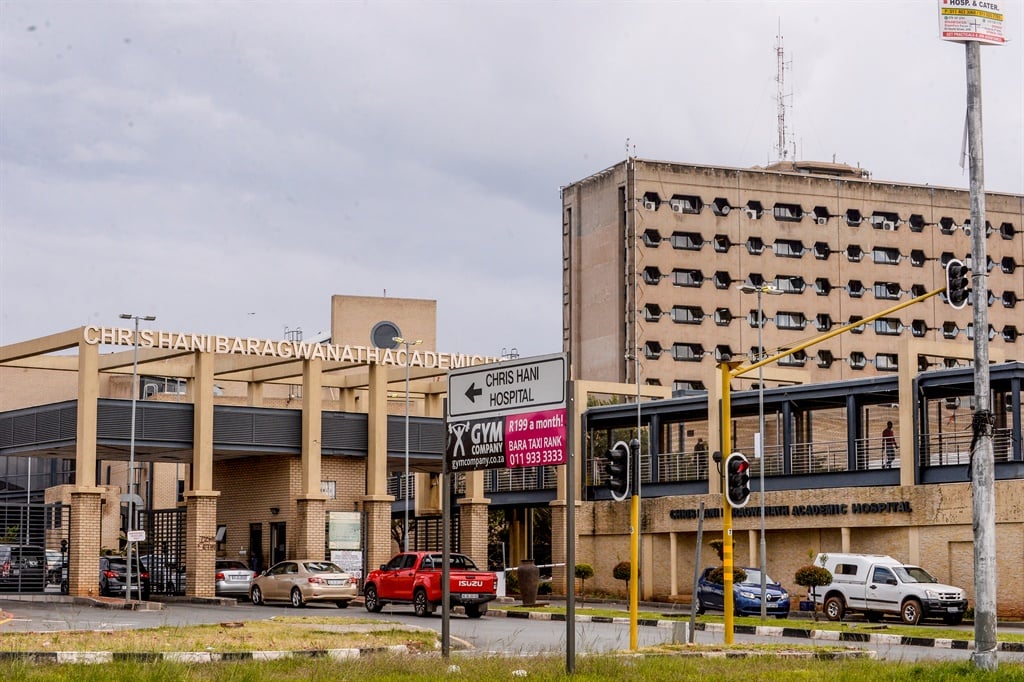Doctors at Chris Honey Baragwanath Hospital were left stranded on Tuesday when they had to work without nurses, administrative clerks and support staff.
PHOTO: Sydney Seshibedi/Gallo Images
- On Tuesday, Chris Hani Baragwanath Academic Hospital was conducting only emergency surgeries.
- Unions affiliated with the Congress of South African Trade Unions, the Federation of South African Trade Unions and the South African Federation of Trade Unions have downed tools for the third time this year.
- Bhekisisa health reporter Jesse Capelin was at the hospital as doctors tried to help as many patients as possible without nurses, administrative clerks or maintenance staff such as plumbers.
We walk along the long walkway that connects the Department of Internal Medicine and the Pediatric Department of Chris Hani Baragwanath Hospital.
Tuesday, November 22, around 12:00 p.m. “We” are the intern doctor working at the “Bar” and me.
Outside, near the main entrance to the hospital, people in trade union uniforms are hanging. In the morning they blocked the entrance. (When I arrived at 11 o’clock it was still locked, so I used the staff entrance.)
Chaos at Africa’s largest hospital. Doctors work, but there are almost no nurses. There are also very few administrative clerks or service staff such as porters who transport patients between wards or to and from theatre.
“Barra was a ghost town this morning,” says the intern, let’s call him Ronnie. He helped me get to the hospital.
READ | Prof Mahdi warns that refusing to renew the contracts of Bara’s 800 health workers is costly.
Hospital workers are on strike as part of the third “national day of action” this year.
The strike was organized by public sector unions affiliated with the major South African trade union federations, the Congress of South African Trade Unions, the South African Federation of Trade Unions and the Federation of South African Trade Unions. The trade unions demand a 10% increase in the salaries of state employees. The government offers only 3%.
Doctors were not asked to strike, but nurses faced pressure and intimidation to stay away from work, several interns at the hospital explained.
“Every ward had a bunch of union guys going to check for nurses,” Ronnie says, pulling out his phone to show me a photo of a man in red regalia he’d seen patrolling the hospital’s corridors before. day
He said:
Several nurses came because they were worried about the patients, especially if they work with children. In order not to be recognized, they dressed as patients or in civilian clothes.
Near one of the medical departments, we meet another intern, let’s call her Layla. Layla says some of the nurses who came to work this morning locked themselves in the wards for fear of being found by union representatives.
“They were so worried that they chased us [the doctors] left the ward and locked themselves in,” Leila explains.
She looks nervous.
“Locking wards can cause serious problems when there are emergencies,” she says, “because doctors then have to fumble with keys to get into that ward and get to their patients.”
The doctors who remained in the 3,200-bed hospital had to continue working – mostly without nurses. “Today I’ve been a nurse, I’ve been a cleaner, I’ve been a plumber, I’ve been a clerk, and I honestly don’t know what to do,” says another emergency room intern. She is talking to me at the same time as she records the patient’s notes on the computer.
The strike not only caused enormous stress to the doctors on her ward, but also affected her patients.
Intern said:
This morning it was decided to have a planned operation [planned non-emergency procedures] will be canceled for the day because there are no nurses available.
“The patients are frustrated, we booked them in for surgery today and when they got here we had to tell them to go home.”
In fact, many of the hospital’s non-emergency patients were sent home to take the pressure off the rest of the staff.
“Many people are being discharged and told to come back tomorrow for chronic medication. But I don’t think many of them will come back, so I don’t know what the long-term effects of that will be, says Layla.
Ronnie explains that many of the patients who had to stay would suffer from compromised care.
READ | Baragwanath Hospital runs out of food, nurses raise money to buy patients corn on the cob for lunch
“Some patients with diabetes need to be constantly monitored, and now that’s not really being done,” he warns. “You need to monitor their sugar levels closely and give them insulin at specific times.
“If they’re understaffed at night, it’s very possible that their sugar levels will get out of control and they’ll have to be sent to an intensive care setting, and there’s not enough staff to run those units anyway.”
I leave Ronnie and race to another part of the hospital where I meet the intern working in the maternity ward. Here, doctors frantically find out where the medicines needed by patients are stored and how to prepare them.
“Doctors are not trained to mix drugs, nurses do that, so we now spend 10 minutes Googling how to do it and then another 10 minutes doing patient vitals, which nurses usually do beforehand. “, the intern explains.
The result? Treatment delays.
Fifteen women have given birth in the waiting room because doctors couldn’t get to them in time, the intern says, the most he’s ever heard of since working at the hospital.
“I’m on autopilot. The best I can do is see and help as many people as possible.”
As I drive out of the sprawling facility’s staff gates, there’s little sign of the chaos going on inside the hospital. The picketers demonstrating at the main entrance to the hospital left, as did the journalists covering it.
But the exhausted doctors I spoke with remain. They were scared of the long-term effect of the strike.
In one of the children’s wards, nurses usually look after about 100 newborns every day.
If they don’t show up for the next shift, she worries, “It would be a disaster.”
This story was created Bhekisisa Center for Medical Journalism. Subscribe to newsletter.








